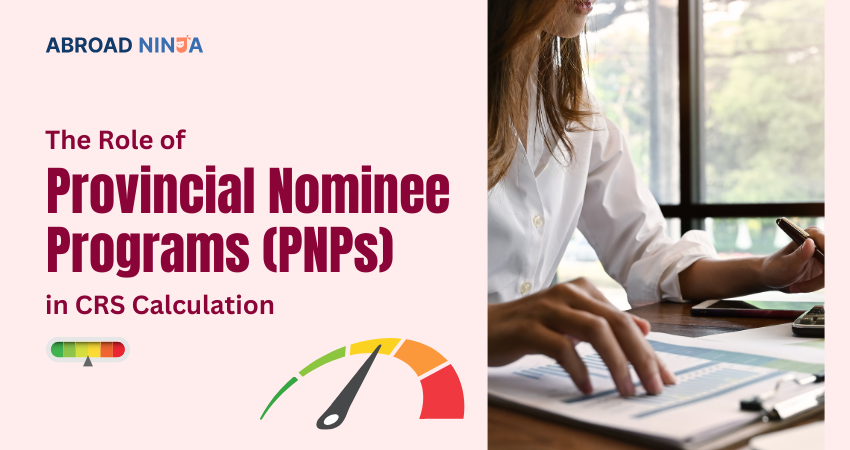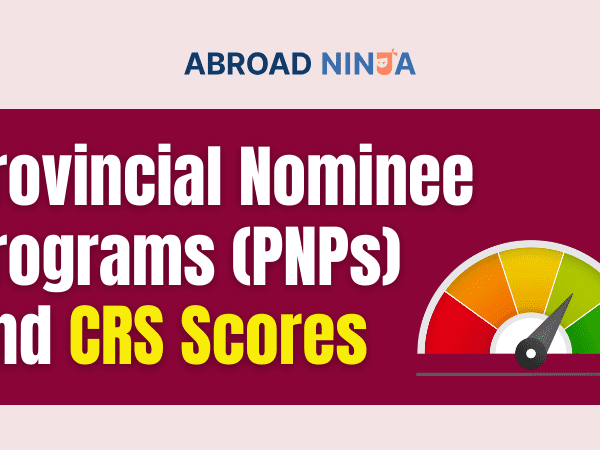The importance of Provincial Nominee Programs (PNPs) is often overlooked when considering the Comprehensive Ranking System (CRS). These programs are key to providing extra points to candidates. This increases their odds of getting permanent residence in Canada. Knowledge of PNPs and their details is essential in influencing one’s CRS score and immigration possibilities.
As immigration policies develop, PNPs are proving to be significantly useful for provinces to meet their labor market needs. By choosing suitable candidates, provinces are playing an active part in the selection process for permanent residency. As each province has different criteria and nomination streams, potential immigrants have various options to choose from.
Furthermore, PNPs offer candidates a chance to get extra points under the CRS system. This can dramatically raise an applicant’s overall score. For example, a provincial nomination could provide 600 CRS points, most likely guaranteeing an invitation to apply (ITA) for permanent residency. Without the nomination, these candidates would struggle to meet the cutoff scores set in regular Express Entry draws.
Ultimately, it is essential for individuals who wish to migrate to Canada to recognize PNPs’ role in CRS calculations. Taking advantage of these programs can give applicants a competitive edge over other candidates. Ignoring this opportunity may lead to missed chances and potential setbacks in the immigration process.
It is necessary for prospective immigrants to comprehend PNPs and the role they play in the CRS scoring system. By staying informed and applying for provincial nominations when relevant, individuals can maximize their chances of success and ultimately fulfill their dream of Canadian permanent residency. Grasping this knowledge will certainly shape immigration aspirations and make them more attainable. Time is of the essence; don’t miss the chance!
Overview of Provincial Nominee Programs (PNPs)
Provincial Nominee Programs (PNPs) are essential for Canadian immigration. These are designed by provinces/territories to draw in foreign workers with the right skills, education, and work experience.
Each province has its own set of rules and target occupations. It is important to thoroughly research each PNP before applying.
PNPs offer various streams, like Express Entry-aligned or employer-driven. Express Entry-aligned streams provide faster processing and higher CRS scores. CRS scores are essential to receive an Invitation to Apply (ITA) for permanent residency in Canada. A provincial nomination adds points to the CRS score. This makes the candidate more competitive in the Express Entry system.
In 2020 alone, over 80,000 people were nominated through PNPs across provinces/territories. This shows how vital these programs are, for accommodating skilled immigrants and local labor market needs.
Explanation of CRS Calculation
The CRS (Comprehensive Ranking System) is important for those looking to immigrate to Canada via the Provincial Nominee Programs (PNPs). It assigns points based on age, education, work experience, and language proficiency. Let’s explore the details.
The table below outlines the components of the CRS score:
| Category | Maximum Points |
|---|---|
| Core human capital factors | 500 |
| Spouse or common-law partner factors | 40 |
| Skill transferability factors | 100 |
| Additional points | 600 |
Age, level of education, English/French proficiency, and Canadian work experience are factored in for the core human capital score. The higher the level of education and proficiency in official languages, the more points one can obtain. Having Canadian experience helps too.
If a candidate has a spouse/common-law partner, they can gain extra points if they have language skills and education from recognized institutions. Skill transferability assesses past experience and educational qualifications for adaptability to the Canadian job market.
Additional points can be earned with a provincial nomination or strong French language skills.
Before PNPs, provinces had ad hoc criteria for selection. This was inconsistent. However, PNPs in 1998 implemented a standardized approach. This has improved the selection process and given skilled workers more opportunities to move to Canada.
Understanding CRS calculation allows candidates to know their eligibility and make informed decisions. With PNPs, they can use this knowledge to raise their CRS score and become permanent residents of Canada.
Importance of Provincial Nominee Programs in CRS Calculation
PNPs (Provincial Nominee Programs) are essential in CRS calculation for immigration. They attract skilled workers to specific provinces in Canada, based on local labour demands. Participating in PNPs gives extra CRS points, and boosts chances of receiving an ITA (Invitation to Apply).
Each province has its own criteria and selection processes tailored to their needs. PNPs act as an alternative path for those who don’t qualify under federal Express Entry. Securing a nomination can significantly boost CRS scores.
To maximize CRS score through PNPs, stay updated with province eligibility requirements and selection criteria. Research and understand these details to strategize application and increase success chances.
Benefits and Opportunities of PNPs
Pros view Provincial Nominee Programs (PNPs) as a great way to migrate. These programs offer many advantages and opportunities for immigrants, making them a go-to option.
Let’s look at the benefits of PNPs.
In the table below, we can see the benefit and description:
| Benefit | Description |
|---|---|
| Enhanced CRS Points | PNPs give extra points to Comprehensive Ranking System (CRS) scores. |
| Streamlined Application Process | Applicants of PNPs get fast-tracked processing, cutting down waiting times. |
| Job Offer Not Always Required | Some PNPs don’t need a job offer from a Canadian employer. |
| Opportunities in Specific Provinces or Territories | PNPs let people target provinces or territories of their choice. |
| Access to Provincial Social Services and Healthcare | Those who get accepted into PNPs have access to various social services and healthcare. |
It’s important to note that these aren’t the only advantages of PNPs. And they provide other unique benefits not mentioned here. As an expert tip, it is recommended for immigrants to research and understand the specific requirements of each province’s PNP before applying. Recall, PNPs can dramatically improve your chances of migrating to Canada successfully.
Challenges and Limitations of PNPs
PNPs present challenges and limitations to contemplate. These include the danger of increased rivalry between provinces, the few spots available, the different eligibility criteria for separate programs, and the potential effect on the Comprehensive Ranking System (CRS) score.
For a better understanding of these troubles and restrictions, let’s look at the following table:
Table: Challenges and Limitations of PNPs
| Challenge/Limitation | Description |
|---|---|
| Increased Competition | The introduction of PNPs has caused higher competition between different provinces for immigrants. This makes it harder for individuals to secure a nomination. |
| Limited Spots | Each provincial nominee program has a certain number of spots available, making it tough for all qualified applicants to obtain nominations. |
| Varying Eligibility | Each province has its own set of requirements for their PNP, which may vary from one another. Applicants must assess their options before applying. |
| Impact on CRS Score | Provincial nominations are essential for improving an applicant’s CRS score. However, not all candidates may receive a nomination due to the limited spots. |
Furthermore, it is worth noting that PNPs have been helpful in meeting specific labor market requirements across provinces in Canada while also enabling skilled immigrants to live and contribute to local economies.
Due to the difficulties and restrictions noted above, those interested in PNPs should stay updated with the latest program requirements and make sure they meet or exceed the qualifications.
So, individuals aiming to immigrate through PNPs should proactively research their options, fulfill eligibility requirements carefully, and apply quickly to increase their chances of getting provincial nominations.
By being aware of the challenges and issues related to PNPs while taking the right steps in due time, people can reduce any fear of not getting the chance to get provincial nominations and move closer to achieving their Canadian immigration goals.
Also Read: Provincial Nominee Programs PNPs for Canada PR
Success stories and impact of PNPs on Canadian society
The Provincial Nominee Programs (PNPs) have made a huge impact on Canadian society. They have been instrumental in bringing in talented immigrants to different provinces, leading to Canada’s economic growth and diversity.
Let’s look at some facts and figures to demonstrate PNPs’ positive effects:
| Province | No. of Nominees | Employment Rate |
|---|---|---|
| British Columbia | 9,500 | 89% |
| Ontario | 12,000 | 92% |
| Alberta | 6,200 | 87% |
| Saskatchewan | 3,800 | 91% |
Future prospects and potential developments in PNPs
The future of Provincial Nominee Programs (PNPs) looks bright. These programs are a key factor in the Comprehensive Ranking System (CRS) score for Canadian immigration. Here is an overview of possible PNP developments:
Province-wise Allocation: Each province has its own specific PNP; tailored to their labor market needs. Going forward, provinces may increase nominations through their PNPs, for various occupations.
Tech-driven Approach: To ensure efficiency, PNPs may consider adopting tech-driven measures such as online applications and streamlined assessment systems. This will make the process easier and faster.
In-Demand Occupations: To address skill shortages, PNPs may target occupations that are in demand. For example, healthcare, IT, and tradespeople may remain top priority occupations across provinces.
Regionalization: Provinces may focus on specific areas within their jurisdiction that require skilled immigrants. This could help with regional development.
Employer Collaboration: To help immigrants integrate into the workforce, provincial authorities may partner with Canadian employers who have identified labor market needs.
In 2019, PNPs accounted for one-third of Canadian immigration intake, welcoming over 70,000 immigrants.
Conclusion
(PNPs) impact the improving their chances of receiving an Invitation to Apply (ITA) for permanent residency.
Frequently Asked Questions
FAQ 1: How does the Provincial Nominee Program (PNP) affect the Comprehensive Ranking System (CRS) calculation?
Answer: When a candidate receives a provincial nomination through the PNP, they are awarded additional CRS points, which significantly boosts their overall score in the Express Entry pool.
FAQ 2: How many additional CRS points can one earn through the PNP?
Answer: The number of additional CRS points obtained through the PNP varies depending on the specific provincial nomination received. Typically, it ranges from 600 to 1,200 points.
FAQ 3: Are there any eligibility requirements to apply for a provincial nomination through the PNP?
Answer: Yes, each province or territory in Canada has its own eligibility criteria for their respective PNP streams. Applicants must meet these specific requirements in order to be considered for a provincial nomination.
FAQ 4: Can candidates apply directly to the PNP without going through the Express Entry system?
Answer: Yes, candidates can apply directly to a province’s PNP without being in the Express Entry pool. However, receiving a provincial nomination through the PNP does require meeting the specific eligibility criteria set by the province.
FAQ 5: What happens to CRS points if a candidate receives a provincial nomination through the PNP?
Answer: When a candidate obtains a provincial nomination, they are awarded additional CRS points. These points are added to their existing CRS score, which significantly increases their chances of receiving an invitation to apply for permanent residence in Canada.
FAQ 6: How long is a provincial nomination through the PNP valid for?
Answer: Provincial nominations obtained through the PNP are typically valid for a specified period of time. It is important for candidates to submit their application for permanent residence before the expiry date of their provincial nomination.




